Intel's Core i7 870 & i5 750, Lynnfield: Harder, Better, Faster Stronger
by Anand Lal Shimpi on September 8, 2009 12:00 AM EST- Posted in
- CPUs
3dsmax 9 - SPECapc 3dsmax CPU Rendering Test
Today's desktop processors are more than fast enough to do professional level 3D rendering at home. To look at performance under 3dsmax we ran the SPECapc 3dsmax 8 benchmark (only the CPU rendering tests) under 3dsmax 9 SP1. The results reported are the rendering composite scores:
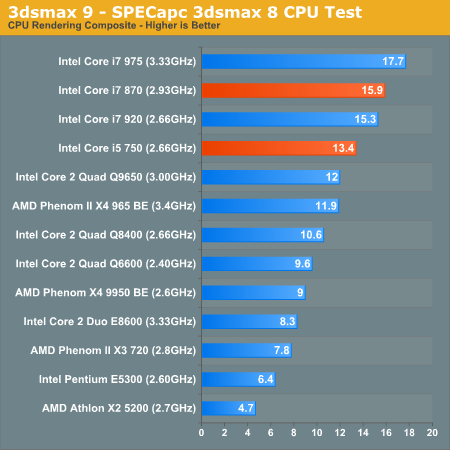
And we're back down to utter dominance yet again. The i5 750 is 12.6% faster than the Phenom II X4 965 BE and 18.8% cheaper. Harder, better, faster stronger.
Blender 2.48a
Blender is an open source 3D modeling application. Our benchmark here simply times how long it takes to render a character that comes with the application.
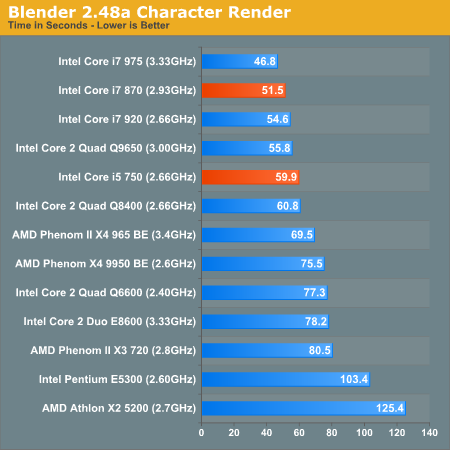
To get Blender to perform right on Lynnfield we actually had to update our graphics drivers. It looks like the on-die PCIe does require the latest NVIDIA/ATI drivers to work properly. The results aren't unusual; Intel has done very well in these tests and Lynnfield continues to dominate. The i5 750 is a bit slower than the 920 (and Q9650) thanks to its missing HT support.
Cinebench R10
Created by the Cinema 4D folks we have Cinebench, a popular 3D rendering benchmark that gives us both single and multi-threaded 3D rendering results.
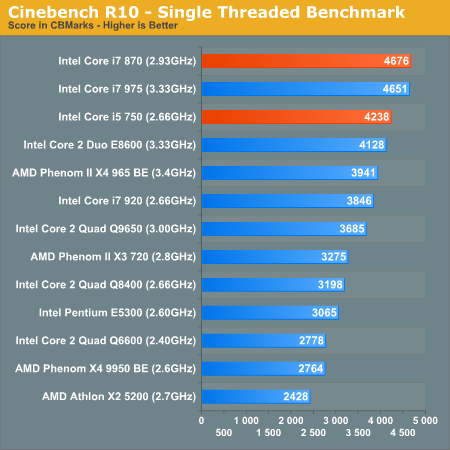
The single threaded benchmark tells us everything we need to know. The Core i5 750 and i7 870 are two of the fastest processors we've ever tested at single-threaded applications. Very few microprocessors will be able to retire instructions from a single thread as quickly as Lynnfield. This is actually very noticeable in simply using the OS. Many tasks still aren't multithreaded but they execute very, very fast on Lynnfield.
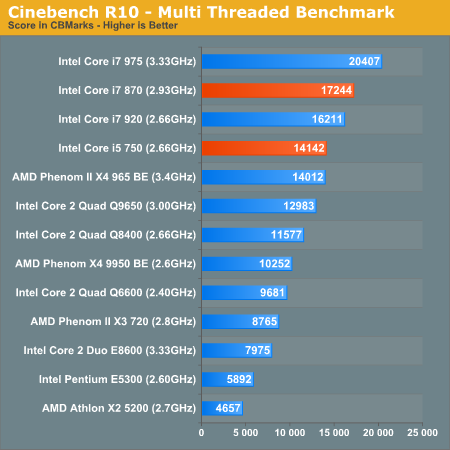
Crank up the threads and Lynnfield is still competitive. Because it's missing Hyper Threading, the i5 750 is barely faster than the Phenom II X4 965 BE. Although I understand Intel wanting to segment its product line, it seems that the i5's missing HT goes a bit too far.
POV-Ray 3.73 beta 23 Ray Tracing Performance
POV-Ray is a popular, open-source raytracing application that also doubles as a great tool to measure CPU floating point performance.
I ran the SMP benchmark in beta 23 of POV-Ray 3.73. The numbers reported are the final score in pixels per second.
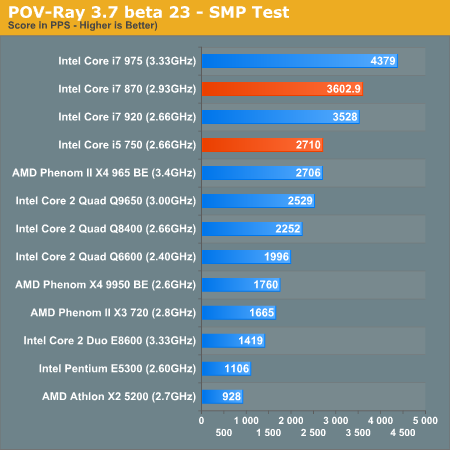
We see the same results under POV-Ray. Regardless of thread count, Lynnfield delivers the best performance possible short of a $1000 CPU.










343 Comments
View All Comments
JonnyDough - Thursday, September 10, 2009 - link
Were you purposely reiterating my point? :DI don't think AMD ever much cared about what Intel was doing. In business class I was taught to keep an eye on a competitor but to really focus on what you are doing. I think AMD was planning their next move, and it had little to do with what Intel was doing or planned on doing, but rather the reaction of what Intel would do when they created Athlon and the next step to being a successful innovative company. Going graphics was just a logical step, since NVidia had no real competition in this space. They saw a market that was ruled by two giants, and decided to combine technology. I'm not so sure that Intel had the idea first. Don't forget, there are leaks in this industry, and people are getting paid to snitch.
tajmahal - Tuesday, September 8, 2009 - link
This is the first time i've ever seen an article written using wholesale x 1,000 prices. Is there any reason you didn't take the trouble to post actual retail pricing?JonnyDough - Tuesday, September 8, 2009 - link
He probably wrote this article prior to today and based it off Intel's pricing scheme...I would think you'd probably gather that. NewEgg is also not the only E-tailer/Retailer out there...ViRGE - Tuesday, September 8, 2009 - link
The last time I checked, those are the only prices Intel gives out. The actual retail prices are a combination of what the retailer paid (buy more, spend less) and whatever markup they add. Intel doesn't have an MSRP.tajmahal - Tuesday, September 8, 2009 - link
i5 750 = $210i7 860 = $300
i7 870 = $580
Just in case someone wants to buy just 1 instead of 1,000. Newegg prices
Gary Key - Tuesday, September 8, 2009 - link
"i5 750 = $210i7 860 = $300
i7 870 = $580
Just in case someone wants to buy just 1 instead of 1,000. Newegg prices "
Retail prices fluctuate greatly at launch. This is what I paid for our retail processors with tax mind you. ;)
i5 750 = $205
i7 860 = $306
i7 870 = $564
cycleback - Tuesday, September 8, 2009 - link
Could you post some Linpack and finite element code benchmarks. This would approximate a larger number of HPC workloads. I would really appreciate this as it is difficult to find these sorts of benchmarks. It would also really test the difference in memory bandwidth between Bloomfield and Lynfield.tacoburrito - Tuesday, September 8, 2009 - link
From the benchmarks, the i7 920 and the i5 seems to be even; each winning about half the benchmarks. If costs for both are the same (proc and mobo), I think I'd still go with the 920. Of course I can stop being a cheap bastard and spring for the i7 860.tacoburrito - Tuesday, September 8, 2009 - link
I also meant to add that it should just be a matter of time before Intel cut the prices of the 920.TA152H - Tuesday, September 8, 2009 - link
One thing that's obvious is, after reading this, that the esteemed reviewer modified his review in order to fulfill his preconceived ideas of what he wanted to say. It's really a terrible review.Most people know this site isn't technical, but still, I always thought it was unbiased. It's biased, big time, just not for a company. It's about making a review say what they want.
For example, I doubt Anand is really as stupid as he sounds in this article. LGA1366 has so many advantages, certainly he knows this. But why the idiotic remarks about asking why it exists?
Why did this review ignore the fact that most people here overclock? Why did it ignore that most people reading these reviews won't use DDR3 1066 memory? Did this site just try to become PC Magazine without the writing talent, and go stock? I think not. It was because they only wanted to give information that was consistent with their preconceived idea.
But, let's look closer. The memory controller on the Bloomfield is actually faster than the Lynnfield when using the same memory, even when running in dual channel mode. Why wasn't it mentioned here?
Why wasn't a clock normalized comparison between the LGA1366 processors and LGA1156 processors made, or even attempted, to get an idea of what the architecture changes accounted for? Strange that this very important data is missing? I think so.
Why weren't overclock processors compared? I mean, will anyone here buy an i7 920 and not overclock it? Probably not many. Since the only real advantage is the more aggressive turbo mode, this was what the article was based on. But, in reality, for readers here, it's not important, since people are going to overclock, and the i7 920 would wipe the floor up with the Lynnfields in the configuration that would be used. Why no mention of this?
There are better sites that have answered these questions. I used to like this site, but this review is another disappointment.
Let's be real though, it looks like the processor's horrible performance in the pre-release configuration is just a bad memory. It's not a bad part by any stretch, but it's hardly made the LGA1366 useless, or even the i7 920. The technical savvy will still opt for it in a lot of instances, since they will overclock it. If you have to recommend something for a friend that won't, these things are fine.
Another really stupid remark was how AMD processors would only make sense if they drop the price. Have you forgotten AMD processors are coupled with excellent IGPs? That's been the big selling point for a while, and this hasn't really changed that, too much. IGP platforms are really big in sales too, so, I'd agree with the premise that AMD probably should lower their prices a little, but not that they don't have advantages even where they are. The processors don't, but you can't get an Intel motherboard with the 790GX either. And if they come out with something better, as rumored, it's just going to give their platform another advantage to help counteract their horrible processors (yes, I agree they suck).